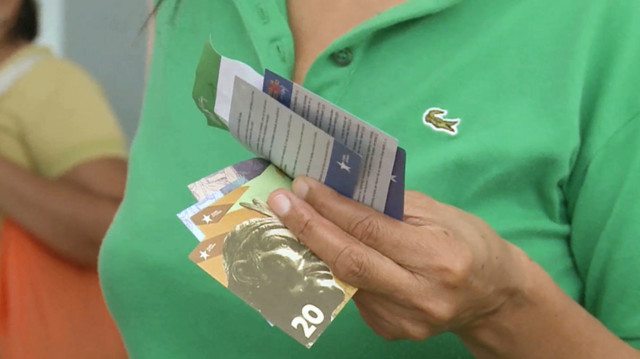Venezuelans have come up with an unusual solution to the hyperinflation that’s made a simple trip to the grocery store an odyssey. Instead of relying on the national currency – the Bolivar – some communities are printing their own.
CGTN’s Stefano Pozzebon reports from Caracas.
Consumers in Caracas have taken to using the Caribe, a new trading paper launched by the Caracas city government.
“I am paying with this new little note. It’s exactly as if I was paying with normal cash, and it’s easy,” shopper Andreina Morales said.
A 2010 law allows local authorities in Venezuela to create their own currencies, an option that has become more appealing as the national currency, the bolivar, loses value every month.
“These trading papers are backed by City Hall’s own bank, and this allows us to get some fluidity back, to have some cash available for shopping,” Barwill Gonzales, from the Markets and Supply Authority at Caracas City Hall said.
The Caracas city government is not the only authority to create its own currency. In the Panal 2021 community located west of the capital, close to 10,000 people trade in Panales, another local currency that was launched last December.
“It’s very useful, people go to the bank, get their Panales, and they can buy everything around here,” clothes seller Noraima La Vital said, “And for us it’s profitable because we are selling.”
The Panal 2021 has its own local bank, BanPanal, which is responsible for printing the Panales and then dispensing the local currency.
Hyperlocal currencies can be seen as a quick and pragmatic tool to curb the effect of hyperinflation. As Venezuelan cash has all but disappeared from the street, for many of the people in Caracas’ markets, this is the only way to purchase food. But creating a new set of currencies with legal value to flow side by side with the national currency in the middle of an economic crisis, also carries other implications.
In most countries, the National Bank is the only entity with the authority to print cash. Economics Professor Luis Zambrano says other organizations like the Caracas city government are not likely to have the capacity to fight counterfeiting.
“As these mechanisms are not managed by an authority that can somehow guarantee what is being printed, they are very prone to corruption, very prone to fraud.” added Zambrano.
For now, these shoppers can bypass some aspects of the inflationary spiral. But as hyperinflation is expected to climb nearly 14,000% this year, and as Venezuelans struggle to defend themselves against an array of economic challenges, local currencies are just one short-term solution.
 CGTN America
CGTN America

